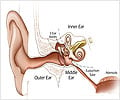A newly unveiled device that translates physiological signals into music may soon help severely disabled children to communicate.

"They can 'read' their children by observing minuscule movements of their lips, or changes in their breathing," she told a Technology, Entertainment, Design (TEDx) conference in Montreal.
By measuring those tiny physiological signals, Blain was able to show that Max, a 15-year-old adolescent who was seemingly in a vegetative state, became animated when he spotted his favorite toy.
Even completely paralyzed, the body continues to react by changes in body temperature and sweat levels, as well as heart and breathing rates, she explained.
Blain initially created a graphic translation of these physiological arousals.
"But my curves and 3D simulations didn't speak to anyone," she said with a smile. So, being a musician, she wrote algorithms to convert them into sounds," she said.
The software she created deciphers physiological signals and translates them into a range of tonalities, from soft low-pitched sounds when an individual is calm to high-pitched and more complicated tunes when they are thinking of pleasant things.
"Imagine that when I arrived at the hospital, the hallways were quiet leading to the rooms of children who could neither move, nor speak, and not even make facial expressions," she said.
"Imagine these hallways now (full of music), imagine parents who can really get to know their children."
Currently, the research team lead by Tom Chau is seeking to expand the technology to make it possible for severely disabled children to answer yes or no when prompted, and use a computer.
Source-AFP
 MEDINDIA
MEDINDIA



 Email
Email





